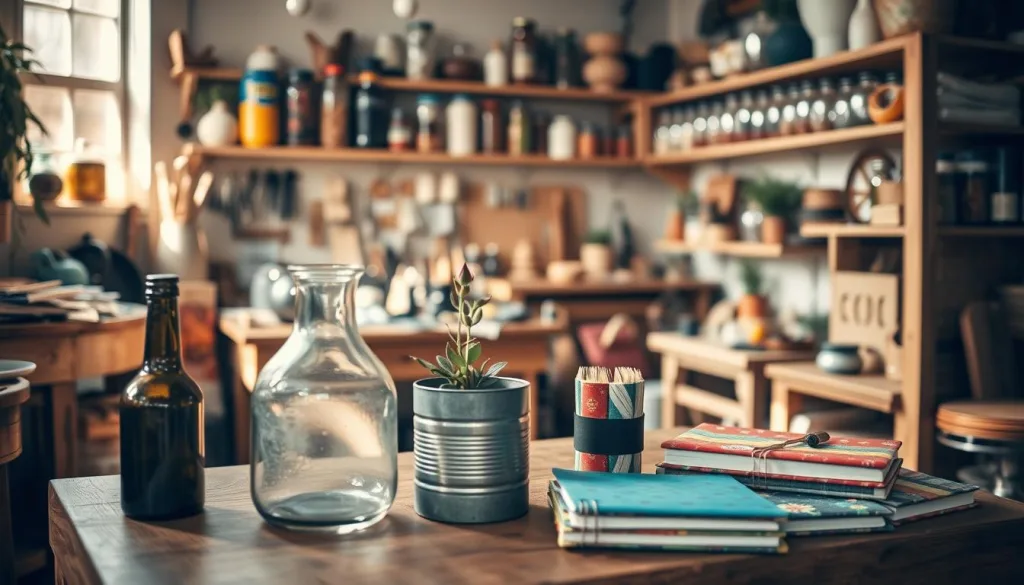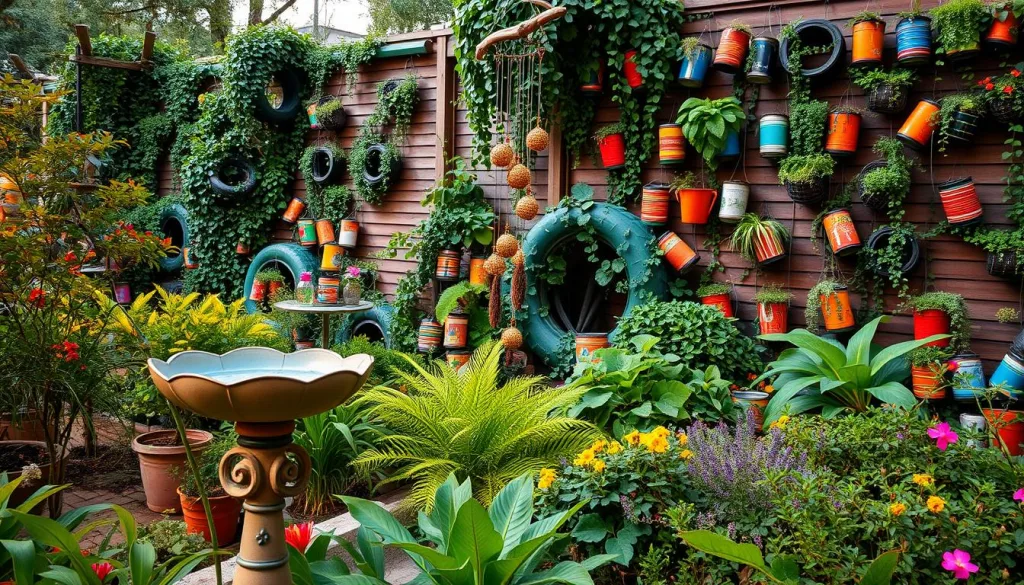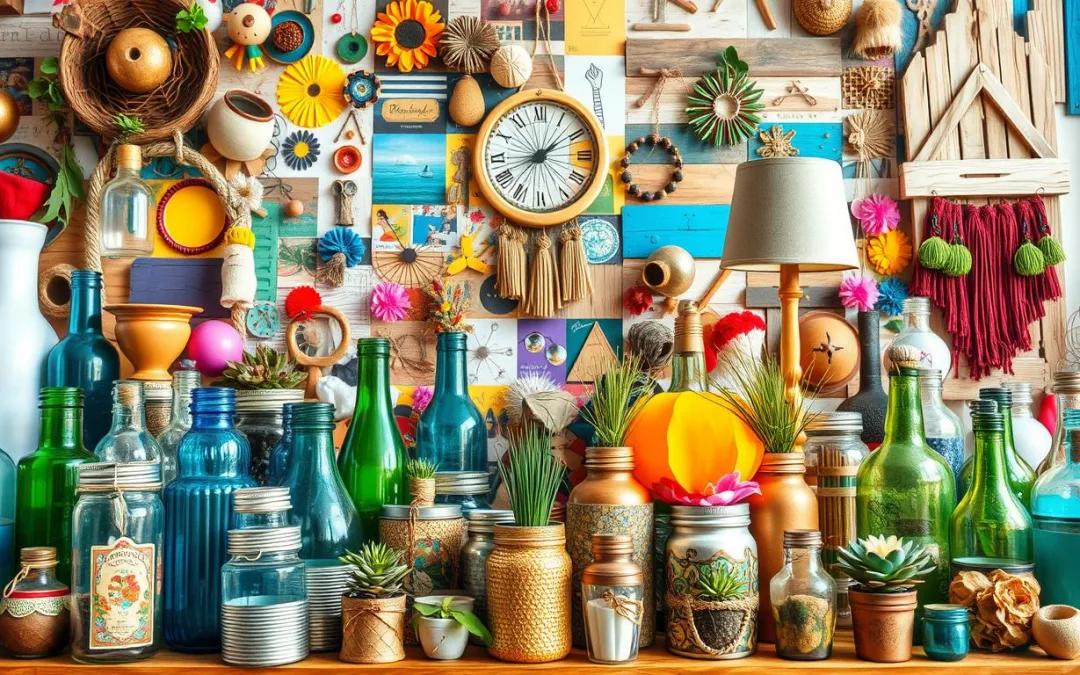Upcycling is a new way to use old items in creative ways. It turns trash into treasure, helping our planet. In the USA, people are making lights from old wine bottles and bags from T-shirts.
More people are getting into DIY upcycling because of environmental concerns. Now, 30% of shoppers are ready to spend more on green products. Upcycling is not just a hobby; it’s a way to fight waste and lower our carbon footprint.
Upcycling can cut down landfill waste by 75%. It can also save you up to $500 a year. The upcycling market is expected to hit USD 410 billion by 2027. This shows how important eco-friendly crafts are becoming.
Key Takeaways
- Upcycling transforms waste into valuable new products
- Reduces household waste by approximately 20%
- Potential to save up to $500 annually
- Supports environmental sustainability
- Creates unique, personalized items from discarded materials
- Reduces individual carbon footprint by 10%
- Supports a growing global market of sustainable products
Understanding the Impact of Upcycling on Sustainability
Sustainable DIY practices are changing how we handle waste and protect the environment. Upcycling is a creative way to repurpose materials that goes beyond recycling. It turns old items into something new and valuable.
Creative recycling is a key solution to our global waste problem. The upcycling market is expected to grow to $56.8 billion by 2027. This shows how important sustainable practices are for our planet.
Environmental Benefits of Creative Reuse
Upcycling has many environmental benefits:
- Reduces waste sent to landfills
- Minimizes production of new raw materials
- Decreases overall carbon footprint
- Supports a circular economy approach
Difference Between Recycling and Upcycling
Recycling breaks down materials to make new products. Upcycling turns waste into something of higher quality or value. This approach adds creativity and value to what would be thrown away.
How Upcycling Reduces Landfill Waste
Upcycling can stop up to 80% of waste from going to landfills. Companies and people are finding new uses for items like old clothes and food packaging.
The Ellen MacArthur Foundation says a circular economy aims to eliminate waste and pollution. It focuses on circulating products and materials, and regenerating nature.
As people become more eco-friendly, upcycling is becoming more popular. It’s a sustainable way to reduce waste and express creativity.
Essential Tools and Materials for Upcycling Projects
Starting with the right tools and materials is key for upcycling. About 60% of upcyclers say the right equipment makes a big difference. This is important for reducing waste effectively.
To start upcycling, you need basic tools to turn old items into new ones. The global upcycling market was worth $10 billion in 2022. This shows more people are into sustainable crafting.
Essential Upcycling Tools
- Sewing Machine: Owned by over 50% of DIY enthusiasts
- Measuring tape
- Tailor’s chalk (used by 75% of sewing enthusiasts)
- Sharp scissors
- Marking pens
- Iron or steamer (used by 90% of upcyclers)
Recommended Materials for Upcycling
Great materials for upcycling include:
- Glass
- Metal
- Fabric
- Wood
- Cardboard
- Packaging materials
By using these materials, you help reduce waste. Upcycling can cut landfill waste by about 30%. It also saves up to 80% of energy needed to make new products.
Remember: One person’s trash is another’s creative opportunity!
Pro tip: Pick versatile materials like polyester thread. It’s strong and works well for many projects, chosen by 65% of upcyclers.
Transforming Common Household Items
Upcycling is a creative way to cut down on waste. It turns everyday items into something new and useful. This section will show you how to make ordinary things into amazing creations.
Glass Bottles and Jars Repurposing
Glass containers are perfect for upcycling. Wine bottles can become elegant table lamps. Mason jars can be:
- Stylish pencil holders
- Rustic flower vases
- Unique candle containers
- Organized kitchen storage
“One person’s trash is another’s treasure” – Upcycling philosophy
Creative Uses for Old Cardboard
Cardboard, often thrown away after shopping, has many uses. Crafters can make:
- Decorative storage boxes
- Children’s playhouse structures
- Organizational desk dividers
- Wall art and photo frames
Plastic Container Innovations
Plastic containers can be turned into something new. They can become wind spirals or planters. These projects help reduce waste.
By using these methods, we can help the environment and be creative. Each item we upcycle is a step towards a greener future.
Reducing Waste Through Upcycling Projects

Upcycling is a strong way to cut down on waste. It’s now a choice for 21% of Americans who want to live more sustainably. These DIY projects turn old items into something new and useful, helping the planet and sparking creativity.
DIY projects that are good for the planet have many benefits. They help reduce waste by giving new life to everyday items. This means finding new uses for things that would usually end up in the trash.
- Clothing transformation: Convert old garments into unique accessories
- Furniture restoration: Breathe new life into worn furniture pieces
- Packaging reuse: Turn cardboard boxes into storage solutions
- Glass jar repurposing: Create decorative containers and organizational tools
The good that upcycling does for the environment is big. It saves resources and cuts down on the need for new stuff. This helps in many ways.
| Environmental Benefit | Impact |
|---|---|
| Reduced Landfill Waste | Divert materials from disposal sites |
| Energy Conservation | Lower production-related energy consumption |
| Resource Preservation | Minimize demand for new raw materials |
Upcycling is more than just saving the planet. It’s a creative journey. It lets people see waste as a chance for new ideas and living sustainably.
Furniture Transformation Techniques
Repurposing materials can give old furniture a new life. Creative recycling turns worn-out pieces into stunning, unique items. Upcycling ideas make even the most neglected furniture into beautiful home accessories.
Furniture restoration is more than just fixing things. It’s about seeing the hidden possibilities in discarded items. With the right techniques, you can transform old pieces, reduce waste, and save money.
Wooden Furniture Restoration
Wooden furniture is perfect for creative recycling. Key techniques include:
- Thorough surface cleaning and preparation
- Careful sanding to remove old finishes
- Repairing structural damages
- Applying new stains or paint
Upholstery Refresh Methods
Reupholstering furniture can completely change its look and extend its life. Beginners can start with simpler projects like dining chair seats, which require minimal tools and skills.
- Select durable, attractive fabrics
- Use a staple gun for secure attachment
- Remove old fabric carefully
- Measure and cut new material precisely
Paint and Finish Applications
Professional-looking finishes can greatly improve furniture’s look. Chalk paint is great for upcycling projects because it adheres well and gives a smooth, modern look.
Upcycling can reduce furniture waste by up to 70% compared to traditional disposal methods.
By using these upcycling ideas, you can transform old furniture and help the environment.
Garden and Outdoor Upcycling Ideas

Turning everyday items into garden wonders is a great way to upcycle. About 70% of gardeners want to use eco-friendly methods. Upcycling projects can cut down on waste and make your garden unique.
Upcycling in the garden is all about creativity and sustainability. Gardeners can give new life to old things. This makes your garden both useful and beautiful, without harming the environment.
- Convert old wooden pallets into vertical garden walls
- Transform retired ladder into plant stands
- Repurpose glass bottles as decorative garden borders
- Use worn-out tires as colorful planter containers
Upcycling can make a big difference in your garden’s health. Here are some interesting facts:
| Upcycling Project | Environmental Impact | Cost Savings |
|---|---|---|
| Tire Planters | Diverts 1.2 billion tires from landfills | Up to 50% reduction in gardening expenses |
| Wooden Pallet Gardens | Reduces wood waste | Saves approximately $200 on garden furniture |
| Glass Bottle Decor | Decreases energy consumption by 10-15% | Low-cost decorative solution |
“Every upcycled item is a small victory against waste and a step towards a more sustainable future.”
By using creative upcycling, gardeners can make amazing outdoor spaces. They also help protect the environment.
Textile and Fabric Upcycling
Textile waste is a big problem. The fashion world throws away a lot, causing 1.2 billion tonnes of greenhouse gas emissions every year. In the U.S., 11.3 million tons of fabric end up in landfills. Upcycling is a great way to cut down on this waste.
Old textiles can get a new life through upcycling. This stops them from ending up in landfills. With only 1% of clothes recycled, making old clothes new again is key for a greener lifestyle.
Denim Repurposing Projects
Denim is perfect for upcycling. You can turn old jeans into:
- Trendy tote bags
- Unique home decor rugs
- Stylish plant holders
- Decorative throw pillows
Old Clothing Transformation Techniques
Turning old clothes into new ones is exciting. Innovative upcycling ideas can make old clothes into useful, stylish items.
| Original Item | Upcycled Creation | Difficulty Level |
|---|---|---|
| Old T-shirt | Reusable Shopping Bag | Easy |
| Worn Jeans | Denim Quilt | Intermediate |
| Faded Shirt | Decorative Pillow Cover | Easy |
No-Sew Upcycling Options
You don’t need to sew to upcycle. No-sew projects are for everyone. They let creativity shine while cutting down on waste.
- Braided rag rugs
- Knotted fabric accessories
- No-sew fabric wreaths
- Woven wall hangings
Upcycling textiles helps the planet and lets us make special, personal items. These items tell a story of sustainability and creativity.
Conclusion
Upcycling is more than a hobby; it’s a way to help the environment. It turns old things into new, useful items. This can cut landfill waste by half and save lots of water and reduce carbon emissions.
Upcycling helps us think differently about what we buy and use. With so much waste worldwide, every small action counts. Reusing things like clothes, glass, or furniture can really help our planet. Local shops and artists also benefit, making unique items and helping the economy.
The future of living sustainably depends on our creativity and effort. More and more people are learning about upcycling and caring for the planet. We’re using 60% more resources than Earth can replace, but upcycling offers a smart way to use what we have.
Our journey with upcycling is about more than recycling. It’s about being creative, supporting local businesses, and saving our planet. By doing this, we can make a big difference, one item at a time.
FAQ
What exactly is upcycling?
How is upcycling different from recycling?
What are the environmental benefits of upcycling?
Do I need special skills or tools to start upcycling?
What types of materials are best for upcycling?
How can upcycling save me money?
Are there safety considerations when upcycling?
Can upcycling be done with no sewing skills?
How does upcycling contribute to sustainability?
Source Links
- Circular Blogs | DIY Upcycling Projects: Transforming Trash into Treasure – https://www.circularblogs.com/blog/diy-upcycling-projects-transforming-trash-into-treasure
- 14 DIY Upcycling Ideas That Will Change the Way You Look at Trash | Levoy Theatre – https://levoy.net/14-diy-upcycling-ideas-that-will-change-the-way-you-look-at-trash/
- Upcycling and repurposing: DIY projects for eco-friendly renovations – https://www.refabdiaries.com/2023/08/upcycling-and-repurposing-diy-projects.html
- Upcycling | Sustainable practices | Zuno Carbon – https://www.zunocarbon.com/blog/upcycling-sustainable-practices
- Upcycling Defined: A Creative Approach to Sustainable Living – https://www.plasticreimagined.org/articles/upcycling-explained-4-ways-it-can-help-the-planet
- Reusing, Recycling, and Upcycling: A Primer – https://www.boisestate.edu/cobe/blog/2023/10/reusing-recycling-and-upcycling-a-primer/
- 9 Tools You Need To Start Upcycling Your Clothes – GreenSuggest – https://greensuggest.com/9-tools-you-need-to-start-upcycling-your-clothes/
- Here’s How We Turned a Dated Dresser Into a Chic Cabinet – https://www.goodhousekeeping.com/home/craft-ideas/how-to/g139/genius-upcycling-ideas/
- 12 Creative Upcycling Ideas to Reduce Waste – Ocean Conservancy – https://oceanconservancy.org/blog/2020/10/19/12-creative-upcycling-ideas-reduce-waste/
- 15 Genius Upcycling Ideas to Save Money and Reduce Waste | – https://skyryedesign.com/diy/15-genius-upcycling-ideas-that-will-save-you-money-and-reduce-waste/
- #27 Upcycling — HEAL THE PLANET – https://healtheplanet.com/100-ways-to-heal-the-planet/upcycling
- Upcycling and reuse: Transforming Waste Into Sustainability – Earth5R – https://earth5r.org/reuse-and-upcycling-transforming-waste-into-sustainability/
- What Is Upcycling? – https://thereusepeople.org/what-is-upcycling/
- Upcycling Techniques: Turn Waste into Unique Home Decor – sustainableliving.org.nz – https://sustainableliving.org.nz/upcycling-techniques-turn-waste-into-unique-home-decor/
- The Art of Upcycling – https://www.fibrenew.com/blog/the-art-of-upcycling/
- The Art of Upcycling: Transforming Old Furniture into New Treasures – https://revelationwoodworks.com/the-art-of-upcycling-transforming-old-furniture-into-new-treasures/
- Upcycling Ideas for Gardens | Upcycle That – https://upcyclethat.com/upcycling-ideas-for-gardens/
- Upcycling Ideas for Garden Decor | Upcycle That – https://upcyclethat.com/upcycling-ideas-for-garden-decor/
- Wealth in Waste: LA’s Textile Upcycling and Recycling – https://la2050.org/ideas/2021/wealth-in-waste-la-s-textile-upcycling-and-recycling
- Upcycling and the Textile Waste Problem — Simple Ecology – https://www.simpleecology.com/blog/upcycling-and-textile-waste?srsltid=AfmBOoooED89wsSBTT52mARamplgsWD6msLaQBNvulR_fcfxyJMTKxRm
- Textile Recycling: Transforming Waste into Value – https://www.smartpatternmaking.com/blogs/articles/textile-recycling-transforming-waste-into-value?srsltid=AfmBOooSmk97qBUfjMkkCO0QUI_8e97VG3UD2haIBRZY1EhWfPKpgvwb
- The Benefits of Upcycling – https://www.futurelearn.com/info/courses/upcycling-for-change-from-green-ideas-to-startup-businesses/0/steps/67684
- What Is Upcycling? Transform Trash into Treasure! – https://www.greenwashingindex.com/what-is-upcycling/


